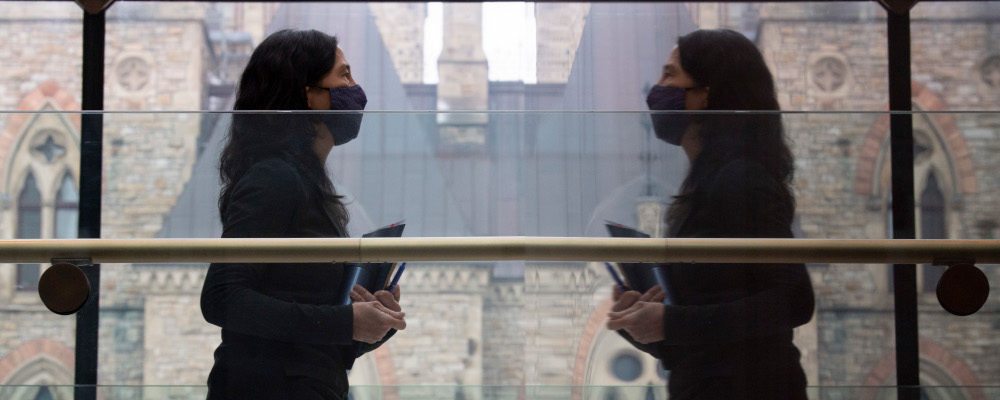Earlier this month, Dr. Theresa Tam announced a new approach to dealing with the COVID-19 pandemic. Recognizing that further waves of cases, hospitalizations, and deaths are unavoidable, she suggested that Canada adopt a more “sustainable” approach to managing the crisis. It’s a significant and long-overdue change of tone for Canada’s top public health officer that seemingly brings Canada closer in line with the U.S. and European countries that are abandoning lockdowns because they have determined that COVID-19 is no longer a public health emergency.
Unfortunately, Dr. Tam’s announcement has been utterly forgotten while the country’s attention has understandably been focused on the so-called “trucker protests” that have consumed downtown Ottawa for the past several weeks, blocked several of Canada’s land borders, made international headlines, and inspired copycat protests across the world. But despite the trucker protests and their political consequences, Dr. Tam’s announcement deserves a closer look.
It should be obvious that public health measures must be sustainable (no rational government would ever impose unsustainable public health measures) and it should not be controversial to say that lockdowns ought to be a last resort. But “sustainable” is a loaded term: how long can people sustain not seeing their families? Their friends? Their colleagues? How long can they go without seeing a play, a movie, a hockey game? How long can we dangle the threat of imminent and repeated closure over small business owners? These are serious questions that the pandemic has forced us to ask. Yet many public health officials seemingly wanted to avoid these difficult questions, and the fact that Dr. Tam’s statement came now—almost two years into this pandemic—reveals a lack of consideration for the broader effects of lockdown measures.
New research shows that lockdown measures generate pandemic fatigue, which in turn fuels distrust in government and public health officials. Managing a pandemic involves not just protecting public health, but a whole host of trade-offs. For lockdown measures to feel legitimate, there must be broad democratic agreement that public health measures are necessary and proportionate, and a clear understanding of what we are sacrificing by locking down. If lockdowns are deemed necessary, governments should be providing quantitative metrics against which to measure the necessity of such lockdowns.
In Denmark, public trust has remained high even during the darkest days of the pandemic, largely because lockdown measures have been as relaxed as possible, when possible. By contrast, Ontario was Ontario stuck in a complete lockdown in the spring of 2021, when cases were nearly a third of what they were during the recent Omicron wave and hospitalizations were less than half. Was the health-care system on the brink of catastrophe then or now?
It’s easy to see how the timing of Dr. Tam’s announcement may look like a capitulation to the demonstrators, the Conservatives, the anti-vaxxers, and the anti-lockdown camp. Folks on the more, shall we say, COVID-alarmist side are seeing it as just that. But capitulation or not, the timing of Dr. Tam’s statement is indeed unfortunate: it really should have come last year when vaccines were being rolled out and we entered the second year of the pandemic. While other countries quickly opened businesses and borders, many provinces required week after week of declining case numbers before allowing businesses to open again and return to full capacity, and the federal government was slow to re-open the border to international travelers who are vaccinated.
Canada’s public health measures have indeed been too severe for too long, and Canadians are right to be upset about it. As Torontonians need not be reminded, they endured one of the longest lockdowns of any major city in the world. As Canadians watched Americans and Brits getting back to the normal and necessary activities of daily life, most provinces remained exceptionally cautious. And nearly two years into this devastating pandemic, Ontario’s ICU capacity remains one of the lowest in the developed world. This lack of capacity is a stunning public policy failure that Ontarians would be well advised to remember in the upcoming provincial elections. The response to an overburdened health-care system should not be “more lockdown”; it should be “more capacity”.
One wonders if the trucker protests could have been avoided had federal and provincial governments and public health officials like Dr. Tam recognized the importance of sustainable lockdown measures earlier on. Perhaps the assortment of science-deniers, racists, populists, and vandals who make up a portion of the trucker movement were always going to end up marching on Parliament Hill. But perhaps not. A more open national conversation of how lockdown measures impacted Canadians’ lives may have mitigated some of the frustration on display in the trucker movement, and it is unfortunate that any such discussion will now be seen as a concession to the trucker movement rather than a legitimate and important aspect of Canada’s response—not just to this pandemic but to future ones as well.
In any event, there are lessons to be learned here. The first is that hospital and ICU capacity across the country must be improved so that lockdowns do not become the default public health measure. The second is that governments and the scientists who advise them must develop a deeper understanding of how isolation and deprivation—the products of severe lockdown measures—manifest in the body politic. With democratic values in many countries seemingly under threat already, we cannot afford to further distance ourselves from one another.




